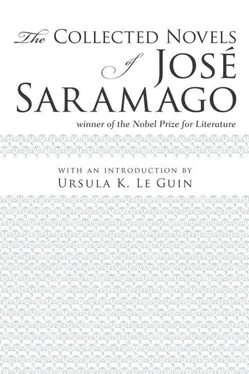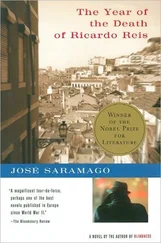SINCE THE FLYING machine landed on Monte Junto, Baltasar Sete-Sóis has gone there some six, or was it seven, times to examine and repair as best he can the ravages caused by time and the elements despite the machine’s protective covering of foliage and brambles. When he discovered that the iron plates had become rusty, he took along a pot of tallow and greased them thoroughly, repeating the process each time he went back. He had also got into the habit of carrying on his back a bundle of reeds that he collected on marshland he encountered along his route, and these he used to repair such cracks and rents in the cane framework as had been made by natural causes, such as when he found a lair with six fox cubs inside the shell of the Passarola. He killed them as if they were rabbits by striking them on the crown of the head with his hook, then tossed their lifeless bodies here and there in the vicinity. The parent foxes would discover their dead cubs, smell the blood, and almost certainly return there no more. During the night the foxes could be heard yelping. They had scented out the trail. When they found their dead cubs, the poor creatures made a great din, and since they did not know how to count, and were uncertain whether all the cubs were dead, they approached the hostile machine that had been their downfall, a machine capable of flying, although now grounded and motionless, they drew near cautiously, worried by the scent of a human presence, and sniffed once more the spilled blood of their offspring, then retreated, snarling and bristling as they went. They were never to return to that spot. But the story might have ended differently if,. instead of being a tale about foxes, it had been a tale about wolves. This also crossed Baltasar’s mind, so, from that day on, he carried his sword with him, the tip of the blade somewhat eroded by rust but still perfectly capable of beheading a wolf and its mate.
He always went alone, and he was planning to go back on his own, when Blimunda said to him for the first time in three years, I’m going too, and this caused him some surprise, and he warned her, It’s a long journey and will tire you out, but she had made up her mind, I want to know the route in case I should ever have to go without you. This made good sense, although Baltasar had not forgotten the danger of encountering wolves in that wilderness, Come what may, you mustn’t go there alone, the roads are bad, the place is deserted, as you may remember, and you could be attacked by wild beasts, whereupon Blimunda replied, You should never say, Come what may, for something unexpected might happen if you use that expression, Very well, but you sound just like Manuel Milho, Who is Manuel Milho, He worked with me on the building site, but he decided to go back home, he said that he would rather die in a flood, should the Tagus burst its banks, than be crushed to death under a stone at Mafra for, contrary to what people say, all deaths are not the same, what is the same is to be dead, and so he went back to his native province, where the stones are small and few and the water is soft.
Baltasar was reluctant to see Blimunda make the long journey on foot, so he hired a donkey, and after making their farewells, they set off, they had not answered when Inés Antónia and their brotherin-law inquired, Where are you going, and warned them, This journey will cost you two days’ wages, and if any crisis should occur we won’t know where to find you, the crisis to which Inês Antónia referred was probably the death ofJoão Francisco, for death was already prowling around the old man’s door, it took one step forward as if about to enter, then relented, perhaps inhibited by João Francisco’s silence, for how can anyone say to an old man, Come with me, if he neither speaks nor responds but only sits there staring, confronted with such a stare, even death loses its nerve. Inés Antónia does not know, Álvaro Diogo does not know, their son, who is at an age where he is interested only in himself, does not know that Baltasar has already confided in João Francisco, Father, I’m going with Blimunda to the Serra do Barregudo, to Monte Junto, to see how the machine is faring in which we flew from Lisbon that time when, you may remember, people claimed that the Holy Ghost had flown over the building site at Mafra, it wasn’t the Holy Ghost, but us, together with Padre Bartolomeu Lourenço, you remember the priest who came here to the house when Mother was still alive, and she wanted to kill a cockerel, but he wouldn’t hear of it, saying that it was preferable to hear a cockerel crowing than to eat it for supper, besides, it would be unkind to hens to deprive them of their cockerel. João Francisco listened to these reminiscences, and the old man, who rarely spoke, assured him, Yes, I remember it well, now go in peace, for I’m not ready to die yet, and when the moment comes I shall be with you wherever you may be, But Father, do you believe me when I tell you that I have flown, When we get old, things that are destined to come about start to happen, and at last we’re capable of believing those things we once doubted, and even when we find it difficult to believe that such things can happen, we believe that they will happen, I have flown, Father. My son, I believe you.
Giddy-up, giddy-up, giddy-up, pretty little donkey, no one could say that of this little donkey, which, unlike the donkey in the refrain, has sores underneath its saddle, but it trots along merrily, the load is light and is carried with ease wherever the ethereal, slender Blimunda goes, sixteen years have passed since first we set eyes on her, but an admirable vigour stems from this maturity, for there is nothing like a secret for preserving youth. No sooner did they reach the marshland than Baltasar set about gathering reeds, while Blimunda collected waterlilies, which she fashioned into a garland and arranged over the donkey’s ears, it made a charming picture, and never had such a fuss been made of a humble donkey, it was like a pastoral scene from Arcadia, although this shepherd was disabled and his shepherdess the custodian of wills, donkeys rarely appear in such a setting, but this one had been specially hired by the shepherd, who did not wish his shepherdess to get tired, and anyone who imagines that this is any common hiring is clearly unaware just how often donkeys get irritated when some heavy load is dumped on their back to aggravate their sores and cause the tufts of hair to chafe. Once the willow canes had been bundled and tied, the load became heavier, but any load that is carried willingly is never tiring, and matters improved when Blimunda decided to dismount from the donkey and proceed on foot, they were like a trio out for a stroll, one bearing flowers, the other two providing companionship.
Spring is here and the countryside is covered with white daisies and mallows, where they cover the path the travellers cut through them, and the firm heads of the flowers are crushed beneath the bare feet of Baltasar and Blimunda, who both have shoes or boots but prefer to carry them in their knapsacks until the road becomes stony, and a pungent odour rises from the ground, it is the sap of the daisies, the perfume of the world on the day of its inception, before God invented the rose. It is a perfect day for their trip to inspect the flying machine, great white clouds pass overhead, and they muse how pleasant it would be to fly just once more in the Passarola, to soar into the sky and circle those castles suspended in mid-air, to venture where birds do not venture, by jubilantly penetrating those clouds trembling with fear and cold, before emerging once more into the blue and heading towards the sun, to contemplate the earth in all its beauty and exclaim, Earth, how beautiful Blimunda looks. But this route is dull, Blimunda looks less beautiful, and even the donkey has shed the lilies, which have become parched and withered, let us sit down here to eat the world’s stale bread, let us eat and then travel on without delay, for there is still a long way to go. Blimunda commits the itinerary to memory as they go along, carefully noting that mountain, that thicket, four boulders standing in a row, six hills forming a semicircle, and the villages, now then, what are they called, Ah yes, Codeçal and Gradil, Cadriceira and Furadouro, Merceana and Pena Firme, and on and on we go until we reach Monte Junto and the Passarola.
Читать дальше












